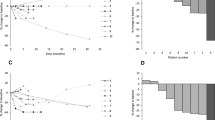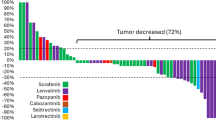Abstract
Background
The aim of our retrospective study was to evaluate the outcome of patients with metastatic medullary thyroid cancer (MTC) treated with tyrosine kinase inhibitors (TKIs) and/or chemotherapy with the emphasis on analysis on the cohort treated by induction TKI because of locally advanced metastatic MTC.
Methods
We analyzed the outcome of 30 patients (21 males, 9 females; median age 63.8 years) with metastatic MTC treated between 2000–2020. Sunitinib was used in 20 patients.
Results
Median progression-free survival on TKI and on chemotherapy was 10.6 (95% CI 7.1–14) months and 3.5 (95% CI 1.4–5.5) months, respectively. Median overall survival from diagnosis and from metastasis presentation was 38.2 (95% CI 4.7–71.7) months and 20.9 (95% CI 13.8–27.9) months, respectively. Eight patients (five females, three males; 58–86 years of age, median age 70 years) were treated with induction TKI because of inoperable locally advanced and metastatic MTC. The response rate to induction TKI was 50%; two patients (25%) had stable disease, and two patients (25%) had progressive disease.
Conclusion
Our data support a new paradigm that TKIs may be the first treatment option in selected patients with locally advanced metastatic MTC, followed by locoregional treatment with surgery and/or external beam radiotherapy. Further studies are required to consolidate the presented data.
Plain Language Summary
A new paradigm of surgery after neoadjuvant/induction tyrosine kinase inhibitors is not accepted as a standard of care in patients with medullary thyroid cancer. The aim of our retrospective study was to evaluate the outcome of all patients with metastatic medullary cancer treated in a 20-year period in Slovenia and, among these, the cohort treated with induction tyrosine kinase inhibitors because of locally advanced metastatic medullary thyroid cancer. Our first hypothesis was that the outcome of metastatic medullary cancer treated with tyrosine kinase inhibitors is better than in those treated with chemotherapy. Our second hypothesis was that induction therapy with tyrosine kinase inhibitors was effective in the treatment of initially inoperable primary tumors. In the treatment of metastatic medullary cancer a systemic therapy was used in 83.4% (25/30) patients. Patients on targeted treatment with tyrosine kinase inhibitors had more often a partial remission than on chemotherapy (65% vs. 17%, respectively). Eight patients were treated with induction tyrosine kinase inhibitors because of locally advanced metastatic disease. The computer tomography evaluation of the primary tumor during tyrosine kinase inhibitor therapy revealed partial response in four cases and stable disease in four cases, but surgery was performed in two cases only. Our data support a new paradigm that tyrosine kinase inhibitors may be the first treatment option in patients with locally advanced metastatic medullary thyroid carcinoma followed by locoregional treatment with surgery and/or external beam radiotherapy. However, further studies are required to consolidate the presented data.



Similar content being viewed by others
References
Milicevic S, Bergant D, Zagar T, Peric B. Ret proto-oncogene mutations in the Slovenian population of patients with medullary thyroid cancer. Onkologija. 2020;21:12–8.
Aschebrook-Kilfoy B, Ward MH, Sabra MM, Devesa SS. Thyroid cancer incidence patterns in the United States by histologic type, 1992–2006. Thyroid. 2011;21:125–34.
de Groot JW, Plukker JT, Wolffenbuttel BH, Wiggers T, Sluiter WJ, Links TP. Determinants of life expectancy in medullary thyroid cancer: age does not matter. Clin Endocrinol (Oxf). 2006;65:729–36.
Russell MD, Kamani D, Randolph GW. Modern surgery for advanced thyroid cancer: a tailored approach. Gland Surg. 2020;9(Suppl 2):S105–19.
Thomas CM, Asa SL, Ezzat S, Sawka AM, Goldstein D. Diagnosis and pathologic characteristics of medullary thyroid carcinoma-review of current guidelines. Curr Oncol. 2019;26:338–44.
Valerio L, Pieruzzi L, Giani C, Agate L, Bottici V, Lorusso L, et al. Targeted therapy in thyroid cancer: state of the art. Clin Oncol (R Coll Radiol). 2017;29:316–24.
Wu LT, Averbuch SD, Ball DW, de Bustros A, Baylin SB, McGuire WP 3rd. Treatment of advanced medullary thyroid carcinoma with a combination of cyclophosphamide, vincristine, and dacarbazine. Cancer. 1994;73:432–6.
Orlandi F, Caraci P, Mussa A, Saggiorato E, Pancani G, Angeli A. Treatment of medullary thyroid carcinoma: an update. Endocr Relat Cancer. 2001;8:135–47.
Wells SA Jr, Robinson BG, Gagel RF, Dralle H, Fagin JA, Santoro M, et al. Vandetanib in patients with locally advanced or metastatic medullary thyroid cancer: a randomized, double-blind phase III trial. J Clin Oncol. 2012;30:134–41.
Elisei R, Schlumberger MJ, Müller SP, Schöffski P, Brose MS, Shah MH, et al. Cabozantinib in progressive medullary thyroid cancer. J Clin Oncol. 2013;31:3639–46.
Schlumberger M, Elisei R, Müller S, Schöffski P, Brose M, Shah M, et al. Overall survival analysis of EXAM, a phase III trial of cabozantinib in patients with radiographically progressive medullary thyroid carcinoma. Ann Oncol. 2017;28:2813–9.
Wirth LJ, Sherman E, Robinson B, Solomon B, Kang H, Lorch J, et al. Efficacy of Selpercatinib in RET-altered thyroid cancers. NEJM. 2020;383:825–35.
Filetti S, Durante C, Hartl D, Leboulleux S, Locati LD, Newbold K, et al. Thyroid cancer: ESMO Clinical Practice Guidelines for diagnosis treatment and follow-up. Ann Oncol. 2019;30:1856–83.
Hartl DM, Guerlain J, Bresuskin I, Baudin E, Lamartina L, Hadoux J, et al. Surgery in the context of kinase inhibitor therapy for locally invasive thyroid cancer. Eur J Surg Oncol. 2020;46:650–5.
Kazahaya K, Prickett KK, Paulson VA, Dahl JP, Manning SC, Rudzinski ER, et al. Targeted oncogene therapy before surgery in pediatric patients with advanced invasive thyroid cancer at initial presentation. Is it time for a paradigm shift? JAMA Otolaryngol Head Neck Surg. 2020;146:748–53.
Cleary JM, Sadow PM, Randolph GW, Palmer EL, Lynch TP, Nikiforov YE, et al. Neoadjuvant treatment of unresectable medullary thyroid cancer with sunitinib. J Clin Oncol. 2010;28:e390–2. https://doi.org/10.1200/JCO.2009.27.4225.
Golingan H, Hunis B, Golding AC, Bimston DN, Harrell RM. Neoadjuvant lenvatinib in advanced unresectable medullary thyroid carcinoma: a case report. AACE Clin Case Rep. 2019;6:e73–8. https://doi.org/10.4158/ACCR-2019-0365.
Jozaghi Y, Zafereo M, Williams MD, Gule-Monroe MK, Wang J, Grubbs EG, et al. Neoadjuvant selpercatinib for advanced medullary thyroid cancer. Head Neck. 2021;43:E7-12.
Besic N, Auersperg M, Gazic B, Dremelj M, Zagar I. Neoadjuvant chemotherapy in 29 patients with locally advanced follicular or Hürthle cell thyroid carcinoma: a phase 2 study. Thyroid. 2012;22:131–7.
Besic N, Auersperg M, Dremelj M, Vidergar-Kralj B, Gazic B. Neoadjuvant chemotherapy in 16 patients with locally advanced papillary thyroid carcinoma. Thyroid. 2013;23:178–84.
Eisenhauer EA, Therasse P, Bogaerts J, Schwartz LH, Sargent D, Ford R, et al. New response evaluation criteria in solid tumours: revised RECIST guideline (version 1.1). Eur J Cancer. 2009;45:228–47.
Carr LL, Mankoff DA, Goulart BH, et al. Phase II study of daily sunitinib in FDG-PET-positive, iodine-refractory differentiated thyroid cancer and metastatic medullary carcinoma of the thyroid with functional imaging correlation. Clin Cancer Res. 2010;16:5260–8.
Ito Y, Onoda N, Ito KI, Sugitani I, Takahashi S, Yamaguchi I, et al. Sorafenib in Japanese patients with locally advanced or metastatic medullary thyroid carcinoma and anaplastic thyroid carcinoma. Thyroid. 2017;27:1142–8.
de Castroneves LA, Negrão MV, de Freitas RM, Papadia C, Lima JV Jr, Fukushima JT, et al. Sorafenib for the treatment of progressive metastatic medullary thyroid cancer: efficacy and safety analysis. Thyroid. 2016;26:414–9.
Chougnet CN, Borget I, Leboulleux S, de la Fouchardiere C, Bonichon F, Criniere L, et al. Vandetanib for the treatment of advanced medullary thyroid cancer outside a clinical trial: results from a French cohort. Thyroid. 2015;25:386–91.
Shindo ML, Caruana SM, Kandil E, McCaffrey JC, Orloff LA, Porterfield JR, et al. Management of invasive well-differentiated thyroid cancer: an American Head and Neck Society consensus statement. AHNS consensus statement. Head Neck. 2014;36:1379–90.
Resteghini C, Cavalieri S, Galbiati D, Granata R, Alfieri S, Bergamini C, et al. Management of tyrosine kinase inhibitors (TKI) side effects in differentiated and medullary thyroid cancer patients. Best Pract Res Clin Endocrinol Metab. 2017;31:349–61.
Trimboli P, Castellana M, Virili C, Giorgino F, Giovanella L. Efficacy of vandetanib in treating locally advanced or metastatic medullary thyroid carcinoma according to RECIST Criteria: a systematic review and meta-analysis. Front Endocrinol (Lausanne). 2018;9:224. https://doi.org/10.3389/fendo.2018.00224.
Crist M, Hansen E, Chablani L, Guancial E. Examining the bleeding incidences associated with targeted therapies used in metastatic renal cell carcinoma. Crit Rev Oncol-Hematol. 2017;120:151e62. https://doi.org/10.1016/j.critrevonc.2017.10.014.
Maniakas A, Dadu R, Busaidy NL, Wang JR, Ferrarotto R, Lu C, et al. Evaluation of overall survival in patients with anaplastic thyroid carcinoma, 2000–2019. JAMA Oncol. 2020;6:1397–404.
Zafereo, M. Selpercatinib before surgery for the treatment of RET-altered thyroid cancer. ClinicalTrials.gov. https://clinicaltrials.gov/ct2/show/NCT04759911 (2021). Assessed 17 Aug 2021.
Acknowledgements
We thank the participants of the study.
Funding
This research and Rapid Service Fee were funded by the Ministry of Education, Science and Sport of the Republic of Slovenia, grant P3-0289, Ljubljana, Slovenia.
Authorship
All named authors meet the International Committee of Medical Journal Editors (ICMJE) criteria for authorship for this article, take responsibility for the integrity of the work as a whole, and have given their approval for this version to be published.
Author Contributions
Conceptualization, CGK and NB; methodology, CGK; formal analysis, CGK; investigation, MMM; data curation, TL and MMM; writing—original draft preparation, CGK; writing—review and editing, NB and CGK; visualization, CGK; supervision, CGK; funding acquisition, NB. All authors have read and agreed to the published version of the manuscript. Correspondence and requests for materials should be addressed to NB.
Disclosures
Cvetka Grasic Kuhar has provided consulting services for Bayer on unrelated projects. Taja Lozar, Nikola Besic, and Maja Music Marolt have nothing to disclose.
Ethics Approval
The study was reviewed and approved by the Protocol Review Board (ERID-KSOPKR-0082/2020) and the Ethics Committee of the Institute of Oncology Ljubljana (ERIDEK-0083/2020) and was conducted in accordance with the Declaration of Helsinki of 1964 and its later amendments. Patient consent was waived by the Ethics Committee of the Institute of Oncology Ljubljana (ERIDEK-00575/2018; 15 March 2018) because of the retrospective nature of our study.
Data Availability
The datasets generated during and/or analysed during the current study are available from the corresponding author on reasonable request.
Author information
Authors and Affiliations
Corresponding author
Rights and permissions
About this article
Cite this article
Grasic Kuhar, C., Lozar, T., Besic, N. et al. Outcome of Patients with Locally Advanced Metastatic Medullary Thyroid Cancer and Induction Therapy with Tyrosine Kinase Inhibitors in Slovenia. Adv Ther 38, 5684–5699 (2021). https://doi.org/10.1007/s12325-021-01940-2
Received:
Accepted:
Published:
Issue Date:
DOI: https://doi.org/10.1007/s12325-021-01940-2




